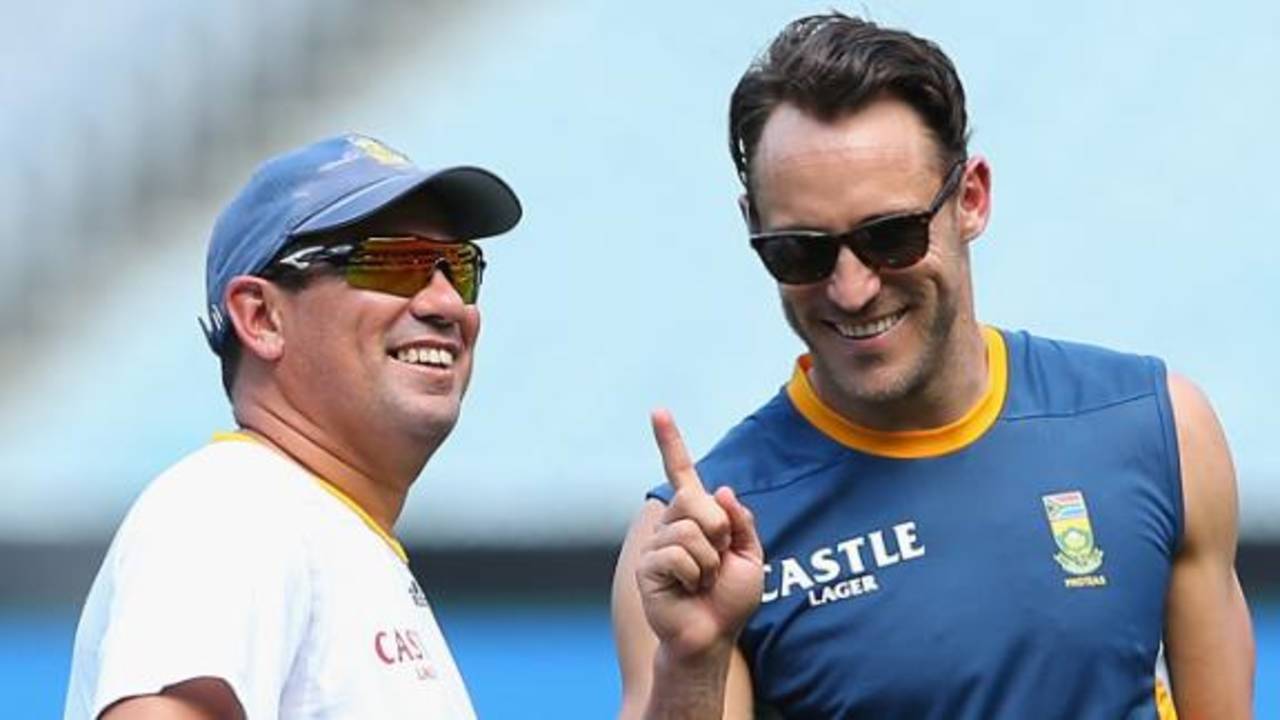The laws do not define 'artificial substance' - Lorgat
Cricket South Africa's chief executive, Haroon Lorgat, has called on the ICC to clarify the laws around polishing the ball in the wake of the Faf du Plessis case
ESPNcricinfo staff
23-Nov-2016
Cricket South Africa chief executive Haroon Lorgat has called on the ICC to clarify the rules around polishing the ball, particularly with regard to what constitutes an "artificial substance", after South Africa's captain Faf du Plessis was found guilty of ball tampering.
A decision has not yet been made on whether du Plessis will appeal the verdict, which resulted in him being fined his entire match fee from the Hobart Test but cleared to play in Adelaide this week. During the Hobart Test, du Plessis shined the ball with saliva while he had a confectionery item in his mouth, which the ICC determined was in contravention of Law 42, which allows players to polish the ball provided no artificial substance is used.
"At this stage we've advised Faf to reserve his position with regard to the match referee's finding and wait for the full reasons of his decision before deciding his next step," Lorgat said in Adelaide on Wednesday. "Very understable, Faf is obviously disappointed by the decision and I can fully understand.
"In fairness to both him and the ICC, this is an unprecedented case involving unique issues of policy, science and performance that need to be carefully considered at the highest levels of the game. There are also issues relating to fair and just process, interpretation of the rules, and importantly, the consistent application of the Code of Conduct that needs to be considered.
"CSA believes that the Laws of the game do not currently define the term 'artificial substance', leaving room for inconsistent application of the rules. For instance, the Laws currently prevent the use of 'artificial substances' to polish the ball, yet artificial cotton fibres from playing kit can be used to shine the ball.
"Players also regularly chew gum when applying saliva to the ball, or ingest sugary drinks and sweets during short breaks in play before shining the ball. No action is taken in such circumstances by the umpires."
"Test match cricket is a competitive sport at the highest level and players and fans deserve certainty around these issues. Integrity and consistent application of the rules are important for everyone. We'll consult with our legal teams. We want to engage with the ICC in a constructive matter, and we want to deal with this properly."
The Code of Conduct charge was laid by ICC chief executive David Richardson, who is also a qualified lawyer. On Wednesday, Richardson said on Australian television that the ICC "drew the line" because du Plessis' actions were "pretty obvious".
"Probably in this case in particular, we drew the line," Richardson told the Nine Network. "We said, 'we need to charge' because in our eyes anyway it was pretty obvious that he was using the residue from the sweet directly on the ball.
"I think the bottom line is if you want to change the condition of the ball by polishing it, in other words improving it, keeping it, retaining its condition, do so, but don't use any artificial substance."
